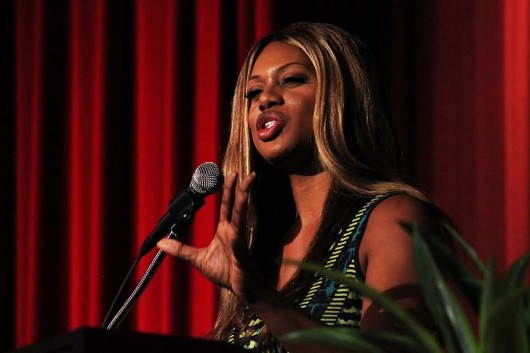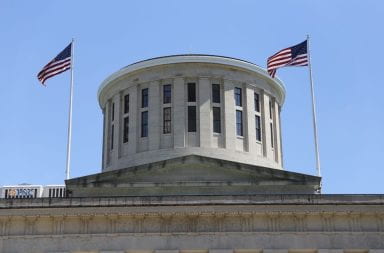
Emmy-nominated actress Laverne Cox speaks to a full auditorium Sept. 16 at OSU’s Fawcett Center.
Credit: Ritika Shah / News director for Lantern TV
“And ain’t I a woman?”
This question — a reference to a famous phrase by Sojourner Truth — was asked to a packed auditorium at Ohio State’s Fawcett Center Tuesday evening by Laverne Cox, a transgender actress known for her role as Sophia Burset in the Netflix series “Orange Is the New Black”and a lesbian, gay, bisexual and transgender advocate.
The audience responded with cheers and applause.
Cox is the first openly transgender person to be nominated for an Emmy, which was for her role as Sophie on “OITNB.” In May, she graced the cover of Time magazine and talked about the transgender movement for the weekly news magazine.
Tuesday’s sold-out event, which was sponsored by the Office of Student Life Multicultural Center among many other LGBT organizations throughout the OSU and Columbus community, filled the Fawcett Center to the brim with “OITNB” fans and fellow LGBT supporters.
When Cox walked on stage, it was to an eruption of applause and an immediate standing ovation.
Cox engaged and interacted with the audience in the forum. Frequent “amens” and rounds of applause followed some of what Cox said.
She was distinct in her ability to both entertain through jokes, humor and stories while also challenging the audience through her intelligence and wit. She often referenced authors and statistics as well as history and historical leaders throughout her lecture.
Cox gave anecdotes from her childhood, including her struggles with bullies that would beat her and chase her home and her experience of being discriminated for race, class and sexual orientation in high school. She then detailed her transformation into a woman — something she said she knew she always was.
She also talked about how her love for dance was key to helping her through difficult times.
“If we have something in our life we’re passionate about, it can save our lives,” she said.
Following Cox’s speech, she met with attendees in a refreshment and photograph session. She then met with a small group to discuss her experiences and answer individual questions.
“I had to accept who I was and own it,” she said. “Fully owning all of this.”
Cox went on to tell the group that the only way to lead a healthy life is to truly accept yourself.
“You can change people’s lives around you by being authentically you,” she said. “No one else can tell you who you are.”
Before Cox stepped on stage, she was introduced by three student speakers, who all shared their own struggles and strengths with the audience while praising Cox for her role model status as a transgender black woman.
“It’s so common for us to feel misunderstood and alone,” said Ari Grubaugh, a fourth-year in political science and sexuality studies and leader of transgender-friendly OSU organization Trans*Mission. “But Laverne is looking to change that … she gives so many people a voice who is silenced.”
Grubaugh went on to say that because of the work of LGBT leaders like Laverne, it helps all people who might be struggling.
“It sends this message that maybe I do have a place in this world,” Grubaugh said.
Cox’s speech resonated with many of the audience members, including Shana Marks, a third-year in business.
“I would say (Cox’s speech was) empowering, just being able to be a voice for so many different identities in one 40-minute talk,” Markus said. “(She was) able to just really embody how diverse this campus is and (be) in the spotlight for so many people.”
Cox also talked about her membership to the Black Methodist Episcopal church, which resonated with some crowd members.
“I’m a Christian, (and) most Christians don’t attend stuff like this,” Marisha Bloxson, a fourth-year in criminology, said. “(Having) background knowledge in that area can really help out in the Christian community, because most people are like, ‘We don’t want that type of people here,’ but it should be an all-loving type of thing.”
Third-year film studies and women’s gender and sexualities student Andori Cuellar also connected with this aspect of Cox’s speech.
“It was such a really powerful and emotional speech she was giving, and a lot of those experiences I’ve experienced also because I’m from super deep south Texas in a super religious area,” Cuellar said. “So being one of the queer people at my school … there was all sort of transphobia and queer phobia, (and) to know that she has lived through all that and has gone to such a high position is just really amazing.”
Cox said that spreading the message of acceptance is important to bridging gaps between people.
“Justice is what love looks like in public,” she said.


